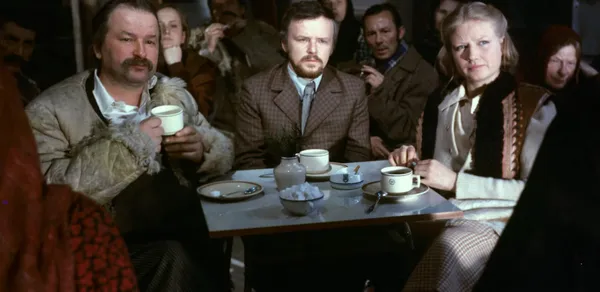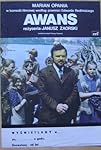Eye For Film >> Movies >> Progress (1974) Film Review
Progress
Reviewed by: Antoni Konieczny

A prodigal son returns to his village at the beginning of Janusz Zaorski’s biting satire – an adaptation of Edward Redliński’s novel. Marian Grzyb (Marian Opania) arrives with a mission: to lead the residents of Wydmuchowo out of darkness and into modernity. The peasants aren’t convinced at first, but by the end, they’ll prove capable of beating him at his own game.
The film was produced by Pryzmat, one of several film collectives in socialist Poland. The group (‘zespół’) was later dissolved over alleged financial negligence and mismanagement during the production of Andrzej Żuławski’s sci-fi art epic On The Silver Globe.
Zaorski, present at a screening at Warsaw's Timeless Film Festival 50 years after the film’s premiere, offered up a few playful key phrases: ‘village within a city’, ‘city within a village’. But it’s perhaps more illuminating to turn to the words of another filmmaker. In a 1971 interview, Pier Paolo Pasolini, when asked about his favourite kind of people, expressed contempt for the petite bourgeoisie’s corruption. He lamented the loss of grace that comes with one’s initiation into culture.
Progress speaks directly to that paradoxical devolution. The opening montage sets the tone with tongue firmly in cheek: we see Marian’s feet on a plane, then a boat, a cart, and finally in the mud. By the time he reaches the village – captured in stunning telephoto compositions by cinematographer Jan Hesse – he still clings to the delusion that he’s a prophet of progress.
The film’s sharpest moments come in its ridicule of the eponymous cult – the Polish countryside is fertile ground for this kind of satire. When Marian concocts a plan to transform Wydmuchowo into a posh rural resort, he effectively invents gentrification and agrotourism, leading the villagers down a path where pseudofolklore becomes a weapon. Now ‘educated’, they exaggerate and perform their peasant roots in a masquerade of simulacra.
The humour here is far from gentle. In a standout moment, Marek Perepeczko – who famously played Janosik: a shirtless highwayman hearthrob – returns from the city a changed man. No longer the monosyllabic Tarzan from Act 1, he’s taken up painting and existentialist reflection. Other villagers, too, mutate into fusion characters across the film, giving the actors room to deliver hysterically dual performances.
While the film is generally a delight, the increasingly surreal third act can be hard to track. The rapid accumulation of absurdities muddles character arcs and exposes the director's reluctance to commit to a more coherent unifying aesthetic form. Still, Progress remains a witty diagnosis of Poland’s schizophrenic class dynamic. Its focus on performative identity feels as timely now as ever.
Reviewed on: 13 Apr 2025

















